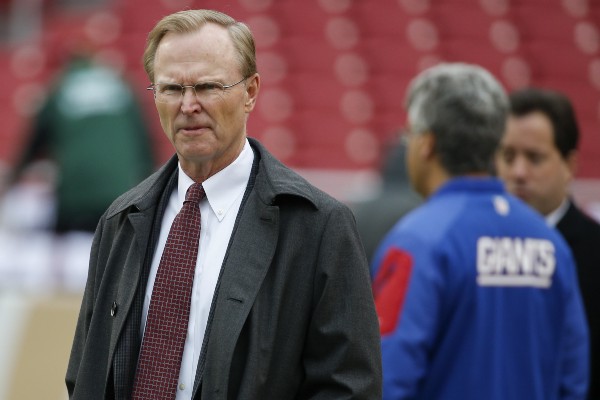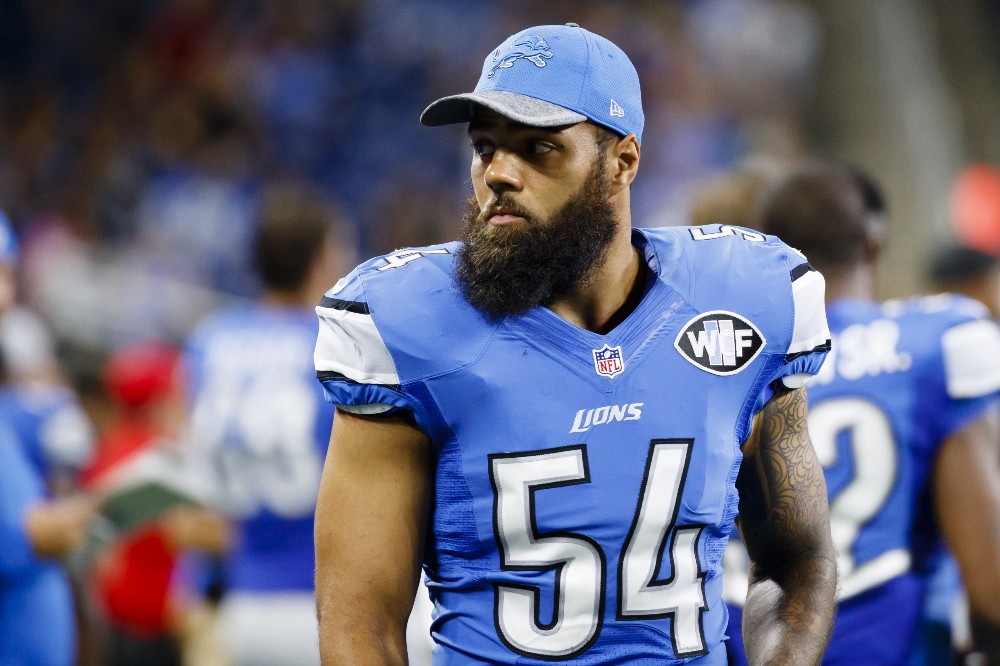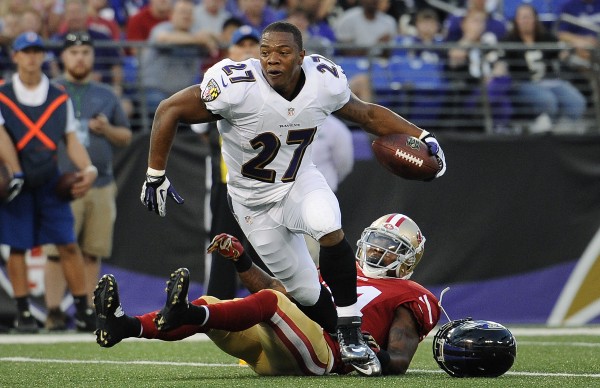Here we go again.
Once again, the NFL is embroiled in a domestic violence controversy, this time centered around New York Giants kicker Josh Brown.
Brown is not Ray Rice. He did not knock his fiance unconscious in the elevator of an Atlantic City hotel. Instead, he was arrested in May 2015 for fourth-degree domestic violence against his then-wife, Molly Brown, who told police after the arrest that Brown had been violent with her over 20 times.
A video of Brown’s violence wasn’t released by TMZ. This time, court documents were released at the conclusion of an investigation by police in King County, Washington. Those documents included letters and journal entries in which Brown admitted to being a serial abuser.
“I viewed myself as God basically and she was my slave,” he wrote in one of the letters, according to NJ Advanced Media.
But despite the differences, the similarities between the NFL’s handling of the two cases is striking. Once again, a player who was initially given a brief suspension by the NFL — in this case, one game — has been cut from his team only after more evidence of the extent of his domestic abuse was released to the public.
Once again, it’s apparent that the league and the team knew much more about the abuse than originally believed, and yet still stood behind their man.
Giants owner John Mara admits he knew NFL Security had to intervene to protect Josh Brown's wife from him at the Pro Bowl hotel. Wow.
— Michael David Smith (@MichaelDavSmith) October 20, 2016
And, once again, the public is left clamoring for some sign — any sign — that the NFL gets it, that it takes domestic violence seriously, that the policies it has in place are doing something, anything, to address the issue.
After the outrage caused by the NFL’s (mis)handling of the Rice incident, the league touted a commitment to improving the problem of violence against women — by educating its players, overhauling its personal conduct policy, and supporting top domestic violence and sexual assault awareness and prevention organizations across the country.
“I got it wrong in the handling of the Ray Rice matter, and I’m sorry for that,” NFL commissioner Roger Goodell infamously said 11 days after the Rice video was released in 2014. “But now I will get it right… We will get our house in order first.”
Last year, ThinkProgress checked in on those initiatives and found that while a solid foundation had been built, the league was still prioritizing P.R. over true progress, and much more work had to be done.
A year later, most of the initiatives are in disarray. While it is taking some steps in the right direction — primarily through donations to outside organizations — the NFL still has a personal conduct policy that is far more lenient than first publicized; a frustrating inability to conduct investigations into domestic violence and sexual assault cases; and a questionable commitment to education, rehabilitation, and awareness.
Investigation and punishment
In August, the NFL announced that Brown, a 37-year-old kicker who signed a two-year deal worth $4 million with the Giants in April, was suspended for one regular-season game for violating the league’s personal conduct policy. While the reason for the suspension wasn’t immediately made available, it didn’t take long for reporters to discover his 2015 arrest(s), and his ex-wife’s reports to police that she had been physically abused by Brown dozens of times.
The suspension was immediately criticized for its leniency. After all, when the NFL announced its new personal conduct policy in 2014, it allegedly came with a six-game minimum suspension for first-time offenders.
Unfortunately, the fine print part of that policy was not closely examined: The policy allows for a suspension to be reduced or increased due to aggravating and mitigating factors, though it does not specify what those factors are.

“What [the Josh Brown case] shows is that domestic violence is an incredibly complex and complicated issue,” Anna Isaacson, the NFL’s vice president of social responsibility, told espnW’s Jane McManus. “It would be wonderful if it was easy to explain. We don’t profess to know everything, but we profess to try to get it right. I hope that what we’ve done in the last two years shows that we’re committed to this issue and fans can trust that.”
The NFL has hired people to oversee investigations into domestic violence issues over the past two years that certainly seem trustworthy, including former New York sex crimes prosecutor Lisa Friel. But there have been 10 domestic violence incidents in the league since Rice, and the league has only handed out a six-game suspension three times.
In the Brown case, the league said the suspension was limited because they couldn’t get the police investigating the case or Molly Brown to cooperate with their investigation. But those mitigating factors have some crucial asterisks.
Deadspin’s Diana Moskovitz reports that the main reason Molly didn’t cooperate with the NFL’s investigation is because she didn’t trust the league.
And King County Sheriff John Urquhart has disputed the league’s claims that the police refused to work with them on the investigation. It turns out that when requesting documents about the case, the NFL investigators didn’t even identify themselves as being with the league.
Urquhart told ESPN’s Outside the Lines that if that had been disclosed, he could have helped in some way.
“Let’s presume or assume that we’d gotten a letter, even if I’d gotten a letter from the NFL saying, ‘Hey, we take domestic violence very, very seriously. We understand you’re investigating one of our players, anything you can do to provide information would be greatly appreciated.’ We would have called them back — I probably would have personally called them back — saying, ‘Hey, we can’t give you the case file, I can’t go into specifics, but this is a very, very serious situation, there’s a lot of investigation that’s going on. We are continuing to investigate, we are continuing to work with his ex-wife — now his ex-wife — with this. Be careful what you do. Don’t get ahead of this, wait for our investigation to be completed.’ We certainly could have let them know how serious this was, which admittedly they didn’t know at the time they suspended him for a game.”
Additionally, while Brown’s personal journal entries and letters only became available to the public last week, there seems to have been plenty of alarming information about the case available to the Giants and the NFL. Moskovitz, who reported extensively on Brown’s case weeks before these King County documents were released, says the NFL has always had access to the Browns’ divorce file, which contains very similar information to the letters and journal entries.
What’s even more alarming is the fact that Giants owner John Mara told a radio host last week that Brown admitted to his team that he had abused his wife.
“He’s admitted to us that he’s abused his wife in the past, I think what’s a little unclear is the extent of that,” Mara said.
It’s unclear why that admission alone wasn’t enough for a six-game suspension. It’s unclear whether a one-strike policy is even what’s best for abusers or victims. And it’s unclear what the NFL’s investigations are turning up since there is no transparency. It is clear that this initiative is only making things more complicated.
Education and rehabilitation
Of course, punishment is only one part of this equation. Two years ago, the league also announced a commitment to educating its players about the issues and providing support and rehabilitation for players who commit crimes.
For the past three years, the league has required all of its employees, including the players and coaches from all 32 teams, to undergo a training session on domestic violence and sexual assault. While the 2016 version is unavailable to the public until later this year, the 2014 and 2015 versions can be watched online. They are fairly short videos that include a power-point style presentation about things like consent and different forms of abuse, interspersed with a few powerful first-person testimonials.
But they’re also a quick, surface-level examination of really complicated topics, so it’s hard to measure their effectiveness.
One one hand, Detroit Lions linebacker DeAndre Levy wrote an incredibly powerful essay on the Player’s Tribune earlier this year crediting the NFL’s presentations for opening his eyes to the prevalence of violence against women, and particularly the concept of consent.
“It led me to challenge ideas that I had internalized, that were part of a culture that often turned a blind eye to sexual assault,” Levy wrote.
That is a phenomenal step, and the importance of Levy’s voice in this conversation cannot be understated. It proves that some people are paying attention.

However, judging by the reaction of some of Brown’s teammates, the message isn’t resonating for everyone. King County Detective Robin Ostrum wrote in court documents that Josh’s teammates were aware of the abuse and did nothing.
“Several of Josh’s teammates were aware of the abuse in their relationship,” wrote Ostrum, “but it is clear none of them did anything to call it to the attention of the team management or take action to help Molly out. Molly feared that people from the NFL/Giants would pressure her into making all of this go away, so that Josh and the team would not face any negative press. Molly was very upfront that in her experience, the NFL publically [sic] says that they have a no tolerance policy on Domestic Violence, but the reality is that they do more crisis management and look to cover things up.”
This is particularly sobering reality considering that the Giants have been one of the most vocal teams in the league’s anti-domestic violence movement. Last year on October 23, 2015, the team partnered with the anti-domestic violence organizations My Sister’s Place and the Joyful Heart Foundation to honor Domestic Violence Awareness month at a home game. The Giants players and management even filmed a No More PSA that focuses on how domestic violence cannot be tolerated.
And yet Giants owner John Mara, who said in 2014 that there is “no place for domestic violence in our sport or our society,” said he was “confident with his decision to continue to employ [Brown]” even after Brown admitted to abusing his wife.
And his teammate Rashad Jennings called Brown a “leader,” as well as “a good friend and a great man,” echoing some of the words that Dallas Cowboys owner Jerry Jones used to describe Greg Hardy after Hardy’s domestic violence history.
“We support him, we’re here for him,” Jennings said.
There is nothing wrong with supporting a friend or a coworker through a difficult time. But at a certain point, supporting becomes ignoring and enabling, particularly if nobody is reaching out to help the victim.
What Brown really needs is the support of a therapist who is trained in helping domestic violence abusers so that he can deal with his issues and begin the long road towards rehabilitation. But according to reports by Moskovitz, that is not the type of help Brown was getting through his NFL Players’ Association-approved counselor.
After his arrest, Brown underwent therapy sessions — primarily over video conference — with a therapist who specialized in anger management and substance abuse therapy. Unfortunately, anger management is not the recommended therapy for domestic violence abusers because the abuser can control his or her anger around everyone except his or her intimate partner. It is a crime of power and control more than it is one of anger. But his therapist, Robert Price, seems to have another idea about domestic violence.
“I think people look at it as a gender crime, as abuse of power,” Price told Moskovitz. “But as you are well aware, in any relationship, both players, both people, have power. And how they go about using it or abusing it begets the cycle of abuse. So you have one individual that chooses to use their power in the different way, and that person doesn’t like it so they try to overpower the situation… Now there is a power struggle. Both people have power.”
Ending violence against women is about much more than just punishment, it’s about changing an entire culture. Considering his teammates and team owner reportedly turned a blind eye to Brown’s abusive behavior, and the therapy he was assigned is actually likely to increase domestic abuse, it doesn’t look like that culture in the NFL has budged.
Community impact
The NFL has arguably had the most success is with its community initiatives. Isaacson and her social responsibility team have devoted a lot of time and resources to assisting programs that focus on domestic violence and sexual assault.
When the Rice video became public, the National Domestic Violence Hotline (NDVH) was flooded with calls, more calls than they had the resources to deal with.
So, the NFL decided to step up and contribute $5 million per year for five years to the hotline. The money allowed the hotline to hire more advocates to answer phone calls, improve its servers, open an office in Washington, D.C., add support staff to the program, and get a bigger office in Austin, Texas, where the hotline is housed.
“We have continued to see an increase in the number of calls, online chats and text messages that we receive at The Hotline and loveisrespect, our youth-focused project,” Katie Ray-Jones, CEO of the NDVH, told ThinkProgress via email. “In the first half of 2016, we received 219,214 contacts compared with 215,380 contacts in 2015. Of the contacts we received from January to June 2016, we answered 158,907–-0.45 percent more than we answered during the same time period in 2015. We expect that the number will continue to grow during the second half of the year.”
The league also has made a $10 million commitment over five years to Raliance, a newly-founded partnership between the National Sexual Violence Resource Center (NSVRC), the California Coalition Against Sexual Assault (CALCASA), and the National Alliance to End Sexual Violence (NAESV).

This partnership was formed directly because of the NFL. The sexual violence community was not as “organized” as the domestic violence community, Karen Baker, the Director of the NSVRC, told ThinkProgress. So when the NFL first approached them back in 2014 and donated $1 million, the organization merely divided that up among its many, many state and local coalitions, meaning some coalitions got as little as $300 from the league.
In order to make better use of the league’s commitment going forward, Raliance was formed and the three organizations pooled their resources and came up with a plan to present to the league. Though the league would not fully fund Raliance’s plan, it did provide a five-year financial commitment. The NFL money has already been used by Raliance to set up an office in D.C. to further the visibility and policy influence of the anti-sexual violence movement, and to fund $600,000 a year in grants that go to local partners.
“I appreciate the NFL’s leadership,” Baker said. “I know it’s — they really are understanding the issue and seem deeply committed to playing a roll in solving it. I just wish organizations would realize that before they have a problem.”
The biggest problem with the NFL’s efforts right now are that they are happening on a national level, while the organizations on the ground are left struggling to deal with these problems on a daily basis. And, notably, the league’s most high-profile domestic violence partnership post-Ray Rice — the No More campaign, featuring PSAs with many NFL stars — has no plans to move forward.
McManus said on Outside the Lines that she believes the league stopped airing the PSAs as a way to distance itself from the domestic violence issue that defined it so much in the post-Rice era. But, it turns out, that is much easier said than done.
While the NFL has made a few honorable attempts at helping reduce the societal problem of violence against women, two years after the Rice, the league’s own house is still in shambles.

